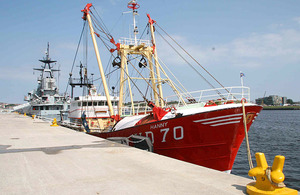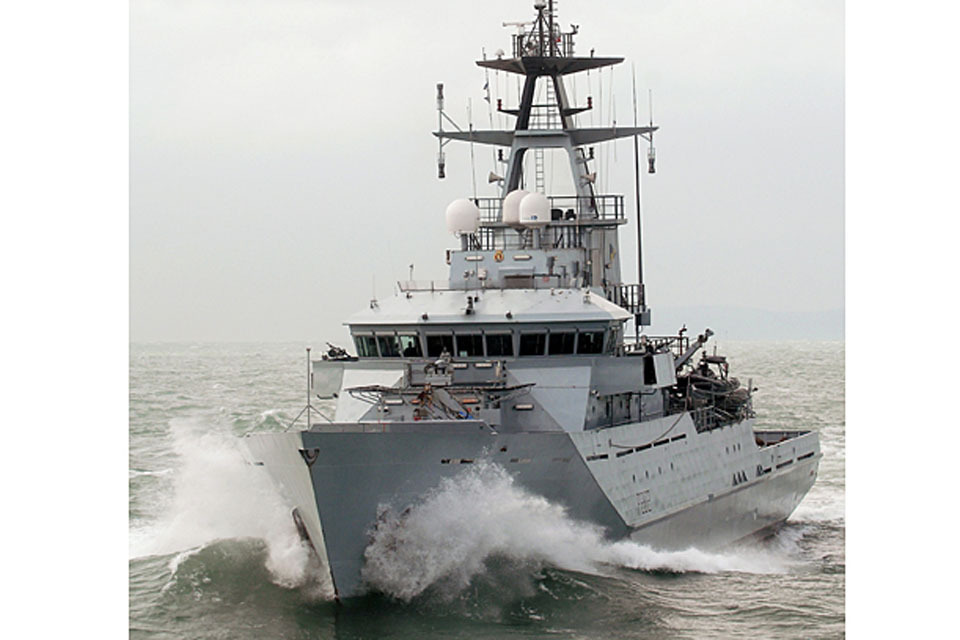Royal Navy detains fishing vessel with illegal nets
The owner and master of a Dutch fishing vessel, caught with nets illegally adapted to catch baby fish, have been fined £51,000 after they were caught by a Royal Navy patrol ship.

The Dutch fishing vessel Hanny alongside with Royal Navy patrol vessel HMS Severn astern [Picture: Crown Copyright/MOD 2011]
HMS Severn’s boarding team made a tactical approach during the early hours of the morning, surprising the fishermen on board the trawler Hanny, which was around 150 nautical miles (278km) from the British coast, in the North Sea.
The First Lieutenant, Lt Chris Carter, accompanied by a Dutch Fisheries Inspector and Able Seaman (Logistician) Sulayman Marong, led the team on board and quickly discovered that both fishing nets had been deliberately constricted or ‘blinded’.
This illegal technique prevents juvenile fish from escaping the net, and causes serious damage to the fishery, with up to 40 per cent of the fish caught being discarded. In consultation with the headquarters of the Marine Management Organisation (MMO), the decision was made to detain the Hanny alongside for further investigation by the MMO Coastal Office in North Shields.
The trawler’s master, Sebastian De Vries, and its owner, Maatschap De Vries, appeared in North Shields Magistrates Court on Friday 29 July 2011, and admitted the charge of ‘using illegal gear attachments on the port and starboard cod ends’.
Owner and master were each fined £1,000 for the illegal attachment, £8,750 for the value of the catch, £14,000 for the value of the gear, a £15 victim surcharge, and £1,761 legal and investigation costs, adding up to a total of £51,052.
The Commanding Officer of the River Class offshore patrol vessel HMS Severn, Lieutenant Commander Marcus Hember, said:
The illegal use of blinded nets within the fragile fisheries of the United Kingdom is extremely irresponsible and risks the livelihood of hundreds of fishermen who are reliant on their sustainability.
These are extremely difficult offences to detect, and, unless we are able to catch offenders red-handed, impossible to prove.
Successful prosecutions such as this one are only possible using the advanced tactical maritime security skills that the Royal Navy is able to bring to the fishery protection task; I am very proud of all my team for their hard work and dedication.

Fishery Protection Patrol Vessel HMS Severn (stock image) [Picture: Leading Airman (Photographer) Kyle Heller, Crown Copyright/MOD 2011]
Lieutenant Carter, who led the inspection, said:
This method of fishing is illegal and damaging to the environment, so I am pleased with this result. Hopefully it will act as a deterrent to other vessels who use similar techniques.
HMS Severn has conducted 240 boardings so far this year, 110 of which have resulted in the detection of infringements of EU or UK law. In 2010, Severn detained seven fishing vessels in port for further investigation, and the Dutch vessel is the third to be detained in 2011. The ship visited Newcastle for three days after the patrol and participated in the Sunderland Air Show.
The ship is one of three sister patrol vessels in the Portsmouth-based Fishery Protection Squadron. The Royal Navy personnel on board are tasked with regulating fishing in UK waters by the Marine Management Organisation which aims to encourage compliance with fisheries legislation through education, advice and guidance to the industry wherever possible.
The MMO may also take enforcement action which could result in a court appearance, potential fines for masters and owners, and forfeiture of equipment imposed by the court. Such action helps to ensure that individuals and operators do not benefit at the expense of honest fishermen, for example by unlawful financial gain or misrepresentation of quotas. It also helps to secure the sustainability of fish stocks for the future and a viable fishing industry.